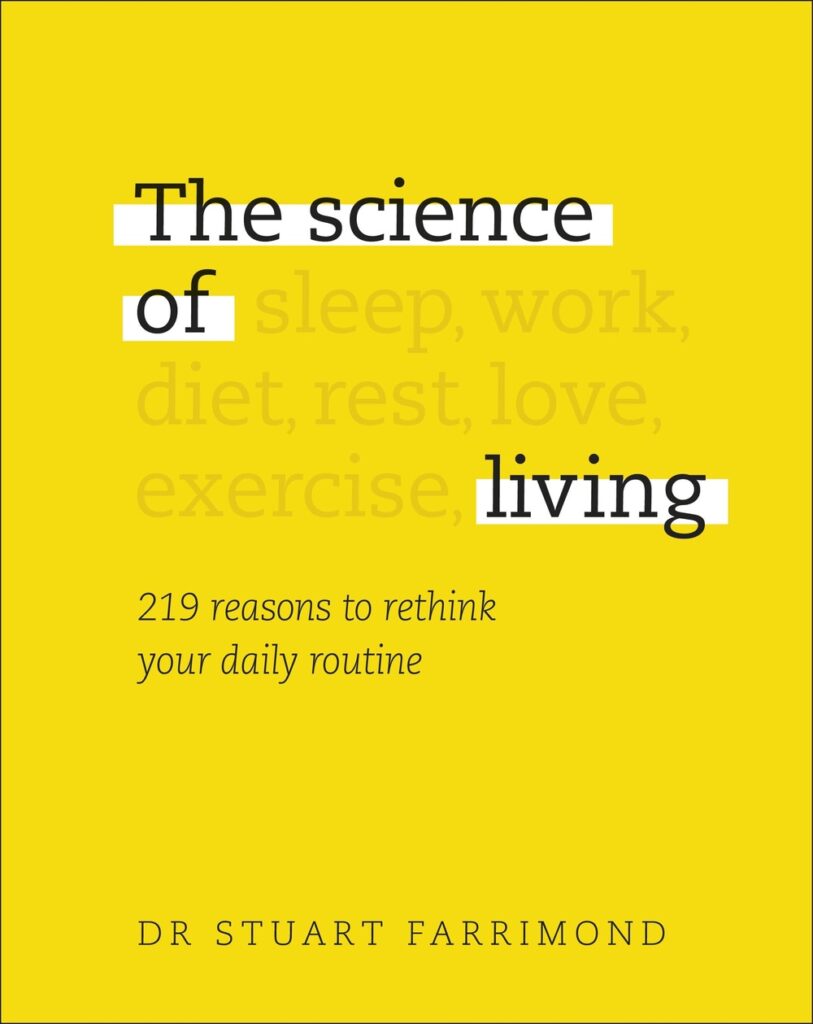Sharing my learnings from the book, The Science of Living by Dr. Stuart Farrimond
The Science of Living by Dr. Stuart Farrimond
Many of the activities we take for granted are in fact contrary to a healthy lifestyle. In this groundbreaking book, long-held beliefs are exploded by new science: drinking eight glasses a day is too much; breakfast isn’t the most important meal of the day; smartphones are not making us all depressed.
Bringing to bear the latest research in psychology, nutrition, biology, and physics, best-selling author Dr Stuart Farrimond unearths the facts behind the fads, and provides take-away advice on every area of our lives – and all delivered in Dr Stu’s trademark style; approachable, authoritative, and above all, entertaining.
The Science of Living debunks pseudo-science and delivers only the facts. One day – one body – over 200 examples of science in action.

- Feeling a bit groggy in the morning is natural. That’s because many of your bodily systems, like the digestive tract and parts of your brain, fall into deep sleep at night.
- the precise timing of when you wake determines how you feel. At night, your body passes through different stages of sleep. The lighter ones are REM phases – that’s when you dream – while the rest are deep and dreamless. If you wake during REM sleep, you’ll often feel refreshed. But waking from deep, dreamless sleep can leave you in a fog, as the frontal, thinking parts of your brain aren’t ready yet.
- getting out into daylight can help, as it increases levels of special “wake-up” hormones. You could also try stretching, gentle exercise, or yoga, as this will increase your heart rate and get blood flow to the regions of your brain that are still “asleep.”
- Everyone has a different body clock, or chronotype. Your chronotype determines whether or not you’re a morning person, a night owl, or something in between.
- there’s no hard evidence that eating breakfast makes you healthier. There’s a small increase in the metabolic rate at breakfast time, but it’s no bigger than with any other meal.
- To provide the body with fuel, nothing beats a bowl of whole grain porridge. It releases energy slowly throughout the morning, and keeps you fuller for longer. In general, it’s best to choose whole grain food over convenience food. Highly-processed breakfast cereals are best avoided, as they’re packed with sugar.
- rather than drinking sugary fruit juice, go for a smoothie – the smoothie pulp retains the fruit’s fibre, which is lost through juicing. That fibre is necessary to maintain good gut health, which is vital to your all-around health.
- Dressing for the weather really is an exact science. If it’s really cold outside, the best thing to do is wear lots of layers. That’s because it’s not the fabric itself that keeps you warm, but the air that’s trapped by the fabric.
- generally, women feel the cold more than men. It’s down to the higher levels of estrogen that women produce – this hormone thickens the blood, which reduces the flow of warmth to the body’s outer parts.
- When it’s hot, you cool down through sweating. The sweat then evaporates, removing heat from your skin. So when it comes to dressing for hot weather, you should look for clothes that aid this process. That means loose clothing.
- By learning how energy levels fluctuate throughout the day, you can make sure that you maximize your productivity, know when to exercise, and take time to relax.
- if you have complex tasks planned for the afternoon, you’re best eating a much lighter snack for your midday meal. It’s also a good idea to stay off the roads after a big lunch, or at least to be extra vigilant when driving. The scientific name for this phenomenon is postprandial drowsiness.
- Along with being part of our success as a species, socializing has individual benefits. As you sit and talk with others, certain areas of your brain light up, which makes socializing feel good. Your brain releases hormones – dopamine, which makes you feel good, and oxytocin, which helps you form attachments.
- Socializing has lasting health benefits too. Regular bursts of these hormones relieves anxiety and lowers stress, which in turn improves your general health.
- When it comes to getting to sleep, there are three key factors.
- temperature of your bedroom – humans fall asleep naturally when the temperature drops.
- darkness – total darkness signals to your internal body clock that it’s time to sleep
- you need to establish a routine – keeping consistent bedtimes and also following a kind of bedtime ritual


Leave a Reply